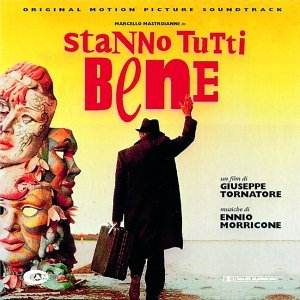Ennio MORRICONE
Stanno Tutti Bene (Everybody's Fine)
 OST
OST
 CAM 4931892
[41:32]
CAM 4931892
[41:32]
Crotchet
Amazon
UK
Amazon
USA

Giueseppe Tornatore's follow-up to the Oscar winning Cinema Paradiso
reunited him with one of the few living legends of film music, Ennio Morricone
and although this score is from a decade ago now, the old maestro has still
fashioned something that has a timeless quality and is well worth resurrecting.
The opening track 'Viaggio' is a jaunty theme, mixing classical elements
in the typical Morricone parody/pastiche style that he so often favours.
In saying that, it's not really one of his best efforts and seems very long
even at just under five minutes.
'Sogno' was actually co-composed with his son, Andrea, although it sounds
so quintessentially like the father you would hardly have noticed. It echoes
very much the composer's past scores with its restrained dissonant ambience,
becoming overtly dramatic in the latter stages.
The accordion led 'La Salina' has a gloomy flavour played against subtle
dissonant chords and the welcome appearance of church organ is rather unexpected
in what is a darkly ominous, extremely effective mid-section. This key melody
works even better in 'Il Vino E L'uva', where it takes on a sorrowful, rather
desolate feel, which could even be seen as a kind of lament.
Track four, 'La Verita' is an excellent example of something which is very
hard to describe, other than to term it simply as Italianesque. It's certainly
a unique orchestral character and style and perhaps it's really more to do
with Morricone's overriding influence on film music in his native country
than anything else. But whatever the case, to my ears this beautiful, tragic
piece is distinctly Italian. Incidentally, it reminded me very much of early
Pino Donaggio (when he was at his best!). This is also reprised in 'Alla
Stazione Con I Barboni'.
Other pieces fair less well, particularly those that use a classical styling.
'Il Cervo Sull'Autostrada', 'Atelier Barocco' and 'Sfilata Di Moda' are all
straightforward pseudo classical works, although 'Lucciole A Milano' is slightly
more inventive and attempts to blend both this and Morricone's usual ambient
disquiet.
Despite the fact that there are a number of more playful pieces like 'Rondini
A Fontana Di Trevi' and 'Notte Nera', most still retain a bitter-sweet
undercurrent. And this aspect of the score provides the main textural theme
for the entire work.
Although I haven't as yet seen the film, I feel certain this is a score that
will truly enhance the images it was written for. This dark, poignant score
of disillusionment and self-deception is an emotional, layered work from
a true artist. And while I would concede that the CD has its fair share of
lesser tracks, the best are very worthwhile indeed.
Mark Hockley

![]()
![]()
![]()
![]()
![]()
![]()
![]()
![]()
![]()
![]()
![]()
![]()
![]()
![]()
![]()
![]()